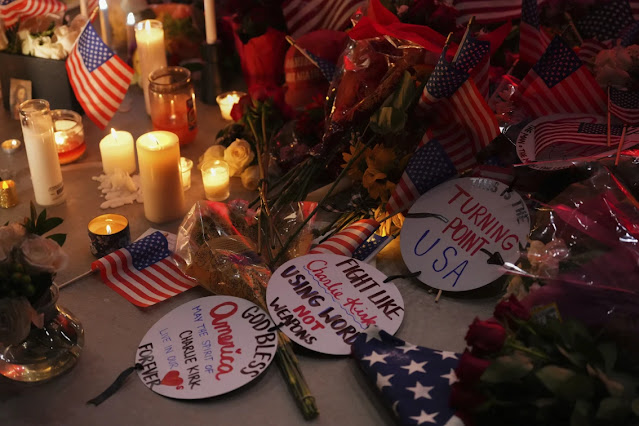SALT LAKE CITY — In a significant development that has underscored the growing concerns over political violence and harassment in the United States, Utah Governor Spencer Cox issued an emergency order on Thursday, September 11, 2025, authorizing law enforcement to search the home of an individual suspected of making death threats against prominent conservative activist Charlie Kirk. The move comes in response to a chilling online threat directed at Kirk, the co-founder of Turning Point USA, a well-known conservative advocacy organization. The suspect, a 24-year-old from California, allegedly posted a menacing message on social media, expressing intent to shoot Kirk at an upcoming event in Utah. This incident has reignited debates about the safety of public figures, the role of social media in amplifying threats, and the broader climate of political polarization in the nation.
The Incident and Immediate Response
The sequence of events began when authorities in Salt Lake City were alerted to a disturbing post on the social media platform X, where the suspect explicitly threatened to target Charlie Kirk during his visit to the University of Utah. Kirk, a polarizing figure known for his outspoken conservative views and his organization’s efforts to mobilize young voters, was scheduled to speak at an event hosted by Turning Point USA on the university’s campus. The post, which was quickly flagged by users and reported to law enforcement, contained graphic language detailing plans to “shoot Charlie Kirk” at the event, raising immediate alarm among local authorities and event organizers.
Upon receiving the report, the Salt Lake City Police Department, in coordination with federal authorities, launched an investigation to assess the credibility of the threat. The suspect was identified as a 24-year-old resident of California, whose name has not been publicly released pending further investigation. The rapid response from law enforcement reflects the heightened sensitivity to threats against public figures in recent years, particularly in the wake of high-profile incidents of political violence, such as the attack on the U.S. Capitol on January 6, 2021, and the assault on Paul Pelosi, husband of former House Speaker Nancy Pelosi, in 2022.
Governor Cox, a Republican known for his moderate stance and calls for civility in politics, acted swiftly to address the situation. On Thursday, he signed an emergency executive order granting law enforcement the authority to conduct a search of the suspect’s home in California. The order, described as a rare but necessary measure, was intended to expedite the investigation and ensure the safety of Kirk and attendees at the University of Utah event. “The safety of our citizens and visitors is our top priority,” Cox said in a statement. “We take all threats of violence seriously, and we will use every tool at our disposal to protect our communities and hold those responsible accountable.”
The executive order authorized a coordinated effort between Utah law enforcement, the FBI, and California authorities to execute the search warrant. While details of the search remain limited, officials confirmed that the operation was underway as of Thursday evening, with investigators seeking evidence such as electronic devices, weapons, or other materials that could corroborate the suspect’s intent. The suspect has not been arrested, and it remains unclear whether charges have been filed as the investigation continues to unfold.
Charlie Kirk and the Context of Political Threats
Charlie Kirk, 32, is a well-known figure in conservative circles, having risen to prominence as the founder of Turning Point USA, an organization dedicated to promoting conservative values among young Americans. With a large following on social media platforms like X, Kirk has become a lightning rod for both support and criticism due to his outspoken views on issues such as immigration, election integrity, and cultural debates. His high-profile role in the conservative movement has made him a frequent target of online harassment, but the recent threat marks a significant escalation in the dangers he faces.
Kirk responded to the incident on X, where he has over 2 million followers, expressing gratitude to law enforcement for their swift action. “I’m thankful for the proactive response from Utah authorities and the FBI,” he wrote. “This is a reminder of the risks we face in standing up for what we believe in, but I won’t be intimidated.” Kirk’s statement reflects the resilience that has characterized his public persona, even as he navigates an increasingly volatile political landscape.
The threat against Kirk is part of a broader pattern of hostility directed at public figures across the political spectrum. In recent years, elected officials, activists, and media personalities have reported a surge in death threats, harassment, and doxxing—tactics that have been amplified by the anonymity and reach of social media. The FBI reported a 50% increase in threats against public officials between 2020 and 2024, a trend that experts attribute to deepening political divisions and the normalization of aggressive rhetoric online.
Dr. Sarah Thompson, a political scientist at the University of Utah who studies political extremism, noted that the incident involving Kirk highlights the challenges of addressing online threats in real time. “Social media platforms have become a double-edged sword,” she said in an interview. “They provide a space for free expression, but they also enable individuals to issue threats that can have real-world consequences. The speed at which these threats can spread requires law enforcement to act quickly, often with limited information.”
Governor Cox’s Role and Political Implications
Governor Spencer Cox’s decision to issue an emergency order has drawn both praise and scrutiny, reflecting the complex dynamics of addressing political violence in a polarized era. Cox, who was elected in 2020 and reelected in 2024, has positioned himself as a pragmatic leader who seeks to bridge divides between conservatives and progressives. His “Disagree Better” initiative, launched in 2023, aims to promote civil discourse and reduce partisan animosity, a message that has resonated with some but drawn criticism from others who view it as insufficient in addressing systemic issues.
By issuing the executive order, Cox has signaled a firm stance against threats of violence, a move that aligns with his broader commitment to public safety. However, the decision has also sparked debate about the balance between security measures and civil liberties. Some civil rights advocates have raised concerns about the use of emergency powers to authorize searches, particularly in cases where the suspect has not yet been charged. “While we understand the need to protect public safety, we must ensure that such actions are conducted with transparency and respect for due process,” said Emily Harper, a spokesperson for the Utah chapter of the American Civil Liberties Union.
On the other hand, supporters of Cox’s actions argue that the governor’s swift response was necessary given the potential danger posed by the threat. “In an era where political violence is becoming all too common, leaders like Governor Cox are right to prioritize the safety of individuals and communities,” said Mark Reynolds, a conservative commentator based in Salt Lake City. “This isn’t about politics—it’s about preventing harm.”
The incident has also fueled discussions about the role of state governments in addressing threats that cross state lines. The suspect’s residence in California complicates the investigation, requiring coordination between multiple jurisdictions. Legal experts note that Cox’s executive order, while unusual, is within his authority under Utah law, which allows the governor to take emergency measures to protect public safety. However, the cross-state nature of the case underscores the need for federal-state collaboration in addressing modern threats, particularly those facilitated by online platforms.
The Broader Climate of Political Polarization
The threat against Charlie Kirk comes at a time when the United States is grappling with heightened political tensions, fueled by contentious debates over issues such as election integrity, gun rights, and cultural identity. The 2024 presidential election, which saw Vice President Kamala Harris defeat former President Donald Trump, was marked by intense rhetoric and allegations of voter fraud, echoing the divisions of the 2020 election. While Kirk and Turning Point USA were active in mobilizing conservative voters during the campaign, their efforts also drew criticism from progressive groups who accused the organization of spreading misinformation.
The University of Utah, where Kirk was scheduled to speak, has been a focal point for political activism in recent years. The campus has hosted both conservative and progressive events, often accompanied by protests and counter-demonstrations. In 2019, a visit by conservative commentator Ben Shapiro sparked significant controversy, with students and community members clashing over issues of free speech and inclusivity. The threat against Kirk has raised concerns about the potential for further unrest, prompting university officials to increase security measures for his event.
Beyond Utah, the incident reflects a national trend of escalating threats against public figures. In 2023, a Michigan man was sentenced to five years in prison for threatening to kill Democratic lawmakers, while a Texas woman faced charges for sending threatening messages to a Republican senator. These cases, among others, highlight the challenges faced by law enforcement in distinguishing between inflammatory rhetoric and credible threats—a task made more difficult by the volume of hostile content on social media.
The Role of Social Media Platforms
The social media platform X, where the threat against Kirk was posted, has faced scrutiny for its role in amplifying inflammatory content. Since its acquisition by Elon Musk in 2022, X has undergone significant changes in its content moderation policies, with a stated emphasis on free speech. While the platform has implemented measures to remove explicit threats of violence, critics argue that its hands-off approach has allowed harmful rhetoric to flourish.
In response to the incident, X issued a statement affirming its cooperation with law enforcement. “We take threats of violence seriously and are working with authorities to provide any relevant information,” the statement read. The company also noted that the suspect’s account had been suspended pending further investigation. However, questions remain about the platform’s ability to proactively identify and remove threatening content before it escalates.
Experts in cybersecurity and social media argue that platforms like X face a delicate balancing act. “The challenge is to protect free expression while preventing harm,” said Dr. Michael Chen, a technology policy researcher at Brigham Young University. “Automated systems can flag certain keywords, but human judgment is often needed to assess the context and intent behind a post. This incident shows how quickly a single post can spiral into a real-world threat.”
Looking Ahead: Implications and Next Steps
As the investigation into the threat against Charlie Kirk continues, authorities are focused on determining the suspect’s motives and whether the individual acted alone or as part of a broader network. The search of the suspect’s home is expected to yield critical evidence, such as communications or materials that could shed light on the individual’s intentions. Law enforcement officials have emphasized that the case is being treated with the utmost seriousness, given the potential for harm.
For Charlie Kirk and Turning Point USA, the incident underscores the risks associated with their high-profile advocacy. The organization has vowed to continue its work, with Kirk stating, “We won’t let fear dictate our mission to engage and empower the next generation of conservatives.” The University of Utah event is expected to proceed as planned, with enhanced security measures in place to ensure the safety of attendees.
Governor Cox, meanwhile, has called for unity in the face of rising political tensions. “We can disagree passionately without resorting to threats or violence,” he said in a press conference following the executive order. “I urge all Utahns—and all Americans—to reject hatred and work toward a more civil discourse.” His words echo a growing sentiment among leaders across the political spectrum who are grappling with how to address the root causes of polarization.
The incident also raises broader questions about the future of political engagement in the United States. As public figures face increasing risks, there is a growing need for solutions that balance security, free speech, and civil liberties. Some advocates have called for stricter penalties for online threats, while others emphasize the importance of addressing the underlying factors—such as misinformation and economic inequality—that fuel division.
In the meantime, the nation watches closely as the investigation unfolds, with many hoping that this incident will serve as a wake-up call for renewed efforts to foster civility and understanding. For now, the focus remains on ensuring the safety of Charlie Kirk and others who find themselves in the crosshairs of a deeply divided society.






